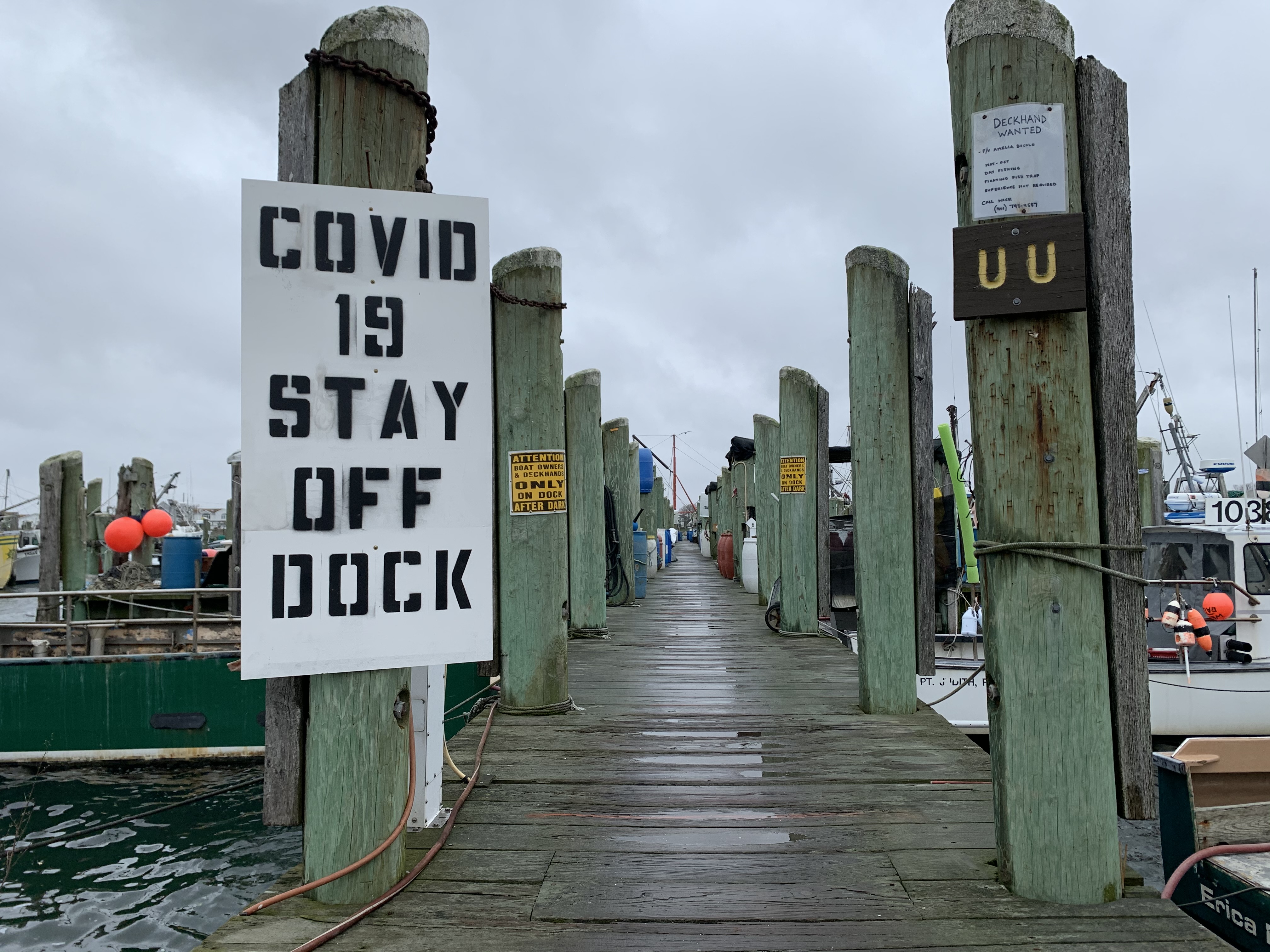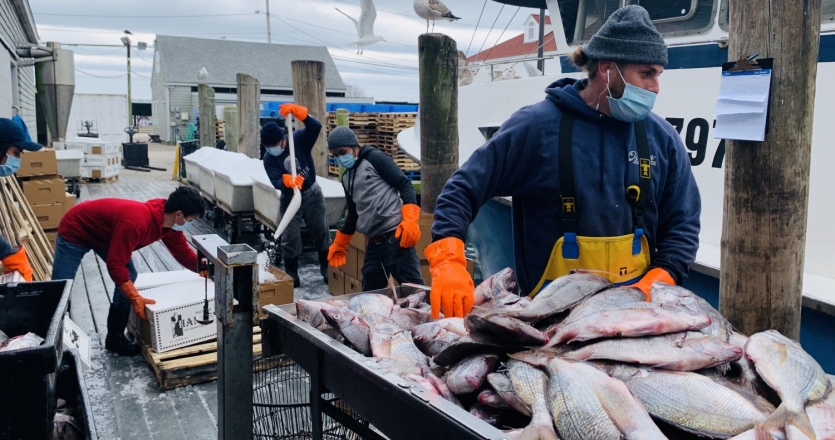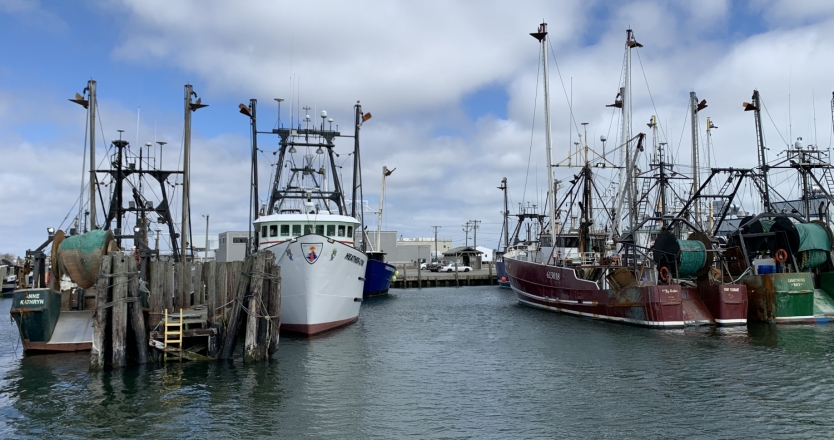Rhode Island Fisheries Caught in the Covid-19 Crisis
In a time of anchored ships and parked planes, we all shake our heads in daily disbelief. How can the Vegas Strip be shuttered? Disney World. New York City. Hotels and restaurants are empty. It’s grim, uncertain.
Truths have emerged overnight. One of them is simple and it hits close to home in Rhode Island: The restaurant industry drives the seafood trade, and without it the working waterfront is looking bleak.
It’s hard to figure out exactly how dependent the commercial fishing industry is on the restaurant industry but here in Rhode Island many put the figure over 80%—and for the large fish processors responsible for moving the bulk of tonnage, the percentage is even higher. The ripple effect within the supply chain is obvious, on local, national and international levels. No fish sold means no money going to crews, captains and boat owners. That also translates to no money going for fuel, ice, mechanics, to the fish cutters or truckers.
Chris Lee, director of Sea Fresh, a large fish processor based in North Kingstown (and who happens to be my brother), explained that small amounts of fish are being caught and trucked to New York and Baltimore, as well being sold here in Rhode Island. “The fish business is in suspended animation right now,” he says. “There just isn’t a big market for it.”
In Point Judith, many boat captains are choosing to go back out to sea to catch some fish. They’re willing to take the risk on a flooded market and low fish prices. Surprisingly, despite the lack of the restaurant market, prices have stayed somewhat strong.
“Fishing is one of the only occupations where you have no idea what you’re going to make when you leave the dock,” says Point Judith fishing captain Brian Loftes. “And now, with all that’s happening, you really don’t know. Actually, I’ve been surprised with some of the prices. I [recently] got paid well for whiting, and the fluke price wasn’t bad either.”
The dealers responsible for offloading the boats and buying, processing and moving the fish are trying to control the amount of fish coming into the port. If all the boats went out at the same time and came in at the same time, the market would likely not be able to handle the volume, and the price would nose-dive. Processors would have to freeze the fish and figure out ways to sell it in the future—which is what is happening for things like scallops and squid. To avoid risks—market risk and the risk of crewmen contracting Covid-19—some boat owners are choosing to keep their boats tied at the dock.
“A few of my boats—the larger ones with larger crew sizes—are not fishing,” says Glenn Goodwin, co-manager of Seafreeze Shoreside, a fish wholesaler based in Narragansett. “We’re going to ride this out tied to the dock.”
To fish or not to fish, that is the question. Commercial fishermen are harvesters—they are providers of food. The industry, therefore, is deemed essential, and the choice to take a boat out for fishing belongs to the owners and captains.
Social distancing at sea is difficult, but not impossible. Crew quarters are tight, wheelhouses and pilothouses are tight, and often crews have to stand near each other when they work. But being socially distant is one of the core reasons fishermen like to fish. Plenty of fishermen would like to be on boat right now, even just to get away from shore for a few days and turn the noise down on the current crisis.
“I fish with a small crew,” says Point Judith scallop captain Mike Marchetti. “We can keep our distance from each other while working. As long as the market stays open, I plan to go fishing.”
Still, no one knows what will happen when the pandemic is over and if, when and how the restaurant industry will rebound. Some Wall Street investors are hopeful for a speedy recovery in the near future with the federal government flowing in fresh capital by the trillions. But how much of this will feed into the Rhode Island fishing industry is yet to be seen. Many aren’t holding their breath.
One big worry is an oversupply of product and a low price on fish. Think of all the shrimp and salmon that isn’t being sold on the world market—all the Maine lobsters, too. Closer to home, it’s Point Judith squid and New Bedford scallops. “We all might be getting a haircut on [the future] price,” says Lee.
Most in the fishing industry are bracing for a long slog for things to right themselves. “There won’t be a light switch that gets flipped, that’s for sure,” says Goodwin. “[Recovery] is going to take time.”
Including fisheries, all industries, are going to experience change from this pandemic. The past 10 years have seen a boom in New England oyster farms. Graham Brawley, managing partner of Ocean State Shellfish Cooperative, has been in the oyster business since 1990. He says, “The oyster market right now is dead.” The same largely goes for Rhode Island’s quahog market.
Brawley oversees the sales of oysters from 12 different Rhode Island oyster farmers. He is concerned about a bottleneck of oysters once the pandemic subsides: too much product all at once. He’s worried, too, about a vastly changed marketplace. “Are people really going to flock to raw bars this summer? Are people going to be willing to pay for a dozen raw oysters? I’m not so sure.”
The beauty of oyster farms and wild-caught fish and shellfish is that there is no active feeding involved for the farmer or the fisher. These resources need no inputs—Mother Nature will take care of the nourishing. The quahogs in Narragansett Bay will stay in the mud and sand; the fluke and scup will stay off Block Island, the haddock will stay on Georges Bank, and the oysters will stay on the farms in the estuaries and salt ponds. Those resources will be there when all this blows over, despite all the pain that many will have to endure.
Covid-19 has created a few bright spots. It has made people seek out local food more than they ever have before—and this is true with fish as well. And although no one is getting rich right now building revenue, new opportunities in direct sales are feeding a sense of community, a sense of collective survival.
The lobster industry is enjoying strong dockside sales in both Point Judith and Newport, and small fish markets across the state are doing well selling curbside, as well as home delivery. People are cooking meals at home—and buying local clams, oysters, lobsters and fish is a great way to keep those dollars right here in Rhode Island.
Selling fish has never been simple. “We’ve always wanted more options than we have,” Marchetti says. “We’ve always wanted at least the option of more direct sales.” And any day now, Rhode Island will set in motion a pilot program for direct sales, boat to consumer.
Although this may sound easy, it has already taken 10 years of work prior to coronavirus to set direct sales in motion. The current crisis is pushing the pilot program into the top slot, making it an emergency measure to give small-boat fishermen another option to sell their fish, especially in more remote parts of the state that don’t have fish dealers, like Block Island and Westerly. It may seem like a drop in the bucket compared to restaurant sales but it provides a point of sale for the fisher and many consumers will enjoy buying whole fish and having a direct conversation (at a safe distance) with the person who caught it. (One requirement is that the fish must be sold whole or headed and gutted and certain species will be restricted from direct sale.)
“A lot of work has gone into this from many different stakeholders and we’re pretty proud of it,” says Robert Ballou, assistant to the director at RIDEM and chairman of the Rhode Island Marine Fisheries Council.
So, even though it is the national restaurant market that really built the infrastructure we see in our fishing ports—from the fish processing plants to ice machines and trucks—the local markets and dockside sales may come out the winner as a result of the pandemic. I know my family has cooked a seemingly endless menu of home meals in the past four weeks. The dishes in the sink never seem to abate, but I’m happy for the locally landed fish and shellfish we are putting on the table.
“This is a great time to go out and get some local fish and bring it home and cook it,” says Kate Masury, director of Eating with the Ecosystem, a nonprofit organization that promotes eating New England–caught seafood. Masury keeps her eyes on the local fish scene. “We are all eating at home right now,” she says. “Why not take advantage of local fish. Find the places in your community who are offering curbside or home deliveries for fish and shellfish. It’s easy, and the system works.”
###
**Edible Rhody will update this article plus its Covid-19 resource page with updates on boat to consumer sales as soon as it is launched. Sign up for our e-newsletter for frequent updates.
For information on seafood retailers and markets offering curbside pickup or home delivery, visit these websites.
- For Rhode Island: http://www.dem.ri.gov/riseafood/buy.php
- New England wide: https://www.eatingwiththeecosystem.org/local-seafood-resources






